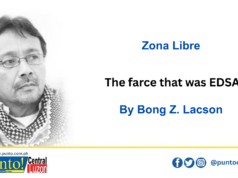IF HYPOTHETICALLY a neighbor, say your motorbike-riding “Bombay friend” shows up in your modest house door, and is more than willing to lend you generous amount for your perennially cash-strapped sari-sari store or perhaps for your personal unfinished Build-Build-Build project (pun intended), will you, can you resist, or do you actually have the powers to say no, to the tempting off er? But, before you jump in to the promised win-win rhetoric, and finally give in to your resounding and unapologetic nod of approval, you decide to first hold back and check out a few things.
The above scenario might not be an exacting existential metaphor to capture the country’s debt deal with goliath China, considering the mammoth scale and size of the expected Philippines-the-borrower and China-the-lender negotiation, but this is the closest parallel image, closest because similar but smaller debt negotiations do happen within our barangay neighborhoods on a daily basis.
Seriously, we have to ask questions: How do we frame our understanding of the China debt deals? Do we really have the choice to avoid the already identified China onerous-sided benefits? Do we really have the capacity to pay back? Why is China-the-lender the sole arbiter and at the same time decision maker in case Philippines-the-borrower is unable to pay? Is it ‘natural’ and even moral for China-the-lender to take hold of the precious Recto Reed Bank, or for that matter any ‘patrimonial asset’ in the West Philippine seas, in a case of default payment by Philippines-theborrower?
However, before we take down the compounding questions, let us consider the possible frame of understanding. And maybe, just maybe, we can work our way out to the other more complicated and aggregating questions revolving around the debt deal dilemma. If we can wax semantics, there are three nagging items on our table: debt, trap and diplomacy. We are aware though that this three-tiered dissection or analysis, if you may, does not make things easy. It just makes things a bit manageable. Although once we are able to reduce each of the three terms to its granular details, we can’t but conflate or put them together as a singular concept.
The debt deal we entered with goliath China is part of the Chinese government’s ambitious “Belt and Road” trillion dollar investment initiative, targeting mostly cashstrapped, mostly smaller and developing countries of the world. This mammoth 50-year investment initiative program is, as we speak, fully operational and has spiraled across the globe, from Africa, Europe, North and South America, and Asia. This Belt and Road Initiative program is China’s visible and strongest statement to the world that she is back as a world economic power, and in this century, this 21st century, all land-roads, in fact all sea navigating belts, will begin and lead back to China.
This is the first and perhaps the most important frame of understanding before we even contemplate to cancel or further our yes to this China debt deals. To the governments of the world, the larger picture or the forest perspective is that you either join this sweeping global economic bandwagon or be left behind. The disgruntled and envious US is attempting to provide a different perspective, if not an alternative economic formula, but as far as the records are concerned, the US attempt has been a sorry failure compared to what goliath China has so far achieved. Indeed, the Chinese are ahead of the economic ball game.
We know we cannot talk about this debt as a standalone, or in isolation, to the geopolitical dynamics, economic conditions, types of governance, within, between and among countries, and most importantly to the larger picture of contemporary globalized political and economic relationships of China and the rest of the world, upon which goliath China is aggressively engineering and unapologetically commanding.
Our existential question as a country is this: In this new political and economic world order where China is leading the way, where do we position or align ourselves? The trap, i.e., debt-trap, is no secret. Unless we, or our leaders are living under a rock, or are ridiculously stupid, we would be so naïve as to enter this debt deals without sorting out the positive and negative repercussions that will affect not only the current but also the future generations of this country.
To be continued





